A black slave and her white mistress become the unlikeliest of allies in the pre-Civil War South in Chromolume Theatre’s impressively sung Los Angeles premiere of Lynn Ahrens and Stephen Flaherty’s gorgeously scored, problematically scripted Dessa Rose.
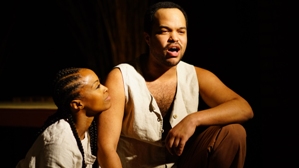 The year is 1847 and 16-year-old Dessa (Shaunté Tabb) is head over heels for fellow slave Kaine (Bradley Allen Turner), that is until he gets beaten to death by his owner, prompting Dessa to attack Kaine’s killer, then get herself whipped, branded, and sold away, then lead an unsuccessful slave insurrection, then find herself in jail and sentenced to be hanged.
The year is 1847 and 16-year-old Dessa (Shaunté Tabb) is head over heels for fellow slave Kaine (Bradley Allen Turner), that is until he gets beaten to death by his owner, prompting Dessa to attack Kaine’s killer, then get herself whipped, branded, and sold away, then lead an unsuccessful slave insurrection, then find herself in jail and sentenced to be hanged.
And that’s just the first of multiple flashbacks recounted by 80-year-old Dessa and 84-year-old Ruth (Abby Carlson), whose upbringings could not have been more different.
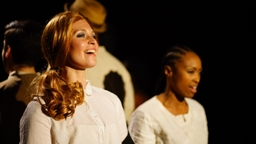 Though Ruth’s Southern belle mother (Claire Buchignani) does her best to instill ladylike graces in her rebellious daughter, it’s clear from the get-go that the 20-year-old has a mind of her own, though unfortunately not enough of one to turn down a marriage proposal from handsome wastrel Bertie (Mikhail Roberts), away “on business” more often than he’s at home and unlikely this time ever to return, his affections having strayed to a blonder, saucier wench.
Though Ruth’s Southern belle mother (Claire Buchignani) does her best to instill ladylike graces in her rebellious daughter, it’s clear from the get-go that the 20-year-old has a mind of her own, though unfortunately not enough of one to turn down a marriage proposal from handsome wastrel Bertie (Mikhail Roberts), away “on business” more often than he’s at home and unlikely this time ever to return, his affections having strayed to a blonder, saucier wench.
Meanwhile, languishing in jail, “Devil Woman” Dessa finds herself visited by aspiring writer Adam Nehemiah (Matt Mancuso) with the intention of including her story in a book he hopes will prove “the female of the species” deadlier than the male, something he is about to discover for himself as his growing sympathy for (and attraction to) Dessa turns to rage and a desire for retribution and revenge.
Based on Sherley A Williams’s 1988 novel of the same name, Ahrens’s 2005 book tries too hard to pack a melodramatic miniseries’ worth of plot into a two-and-a-half-hour musical, and this reviewer for one can’t help wondering if Terrence McNally, who wrote the books for Ahrens and Flaherty’s Ragtime, A Man Of No Importance, and Anastasia, might have figured out a way to make the tricky source material less disjointed, or solved the problem of frequent, awkward flashbacks requiring young actresses to step in and out of old-age voices and poses.
Fortunately, once its two protagonists finally meet, Dessa Rose gains emotional oomph as Dessa begins to recover her heart and Ruth finds her own in the arms of Nathan (Mykell Barlow), one of the runaway slaves she ends up harboring and with whom she and Dessa concoct a risky scheme to acquire financial independence and freedom, each in her own way.
Fortunately too, composer Flaherty’s melodies soar throughout, from the full-cast harmonies of the stirring “We Are Descended,” “Fly Away,” and “Over The Line,” to Dessa’s moving autobiographical tale of “Twelve Children” sold into slavery (she the youngest of the twelve), to Ruth’s equally powerful “At The Glen,” to the exquisite “In The Bend Of My Arm,” that juxtaposes Dessa and the man she loved and lost, Ruth and the love she has at long last found, and Nehemiah, alone in his quest for vengeance.
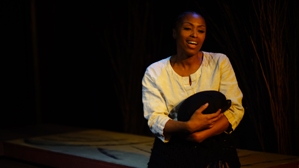 It helps enormously that director James Esposito found his ideal Dessa Rose when leading lady Tabb walked into the audition room. As stunning to look at as she is glorious of voice, the fierce and fabulous Tabb could just as easily be playing Dessa on any major regional theater stage, she is that sensational.
It helps enormously that director James Esposito found his ideal Dessa Rose when leading lady Tabb walked into the audition room. As stunning to look at as she is glorious of voice, the fierce and fabulous Tabb could just as easily be playing Dessa on any major regional theater stage, she is that sensational.
A revelatory Carlson takes us from a 20-year-old Ruth with only an incipient mind of her own to the resourceful, loving, independent woman she becomes, sings quite splendidly, and ignites palpable romantic sparks with the dynamic, charming, velvet-voiced Barlow.
(If only Ruth’s authenticity weren’t compromised by a store mannequin’s glaringly synthetic strawberry-blonde wig in a cast otherwise sporting their own locks.)
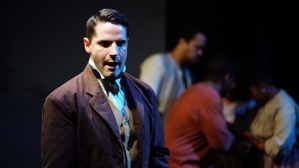 Mancuso’s increasingly obsessed Nehemiah, Roberts’ Bertie and Sheriff Hughes, Buchignani’s old-school Ruth’s Mother, Ken Maurice Purnell’s Harker, and Kymberly Stewart’s assortment of mammies each denied her own name are vocal standouts, with Ambrey Benson (Annabel), Margaret Berkowitz (Susannah), Zach Campa (Mr. Steele, Mr. Oscar, and Sheriff Pine), and Bradley Alan Turner (Kaine, Philip) completing the cast to fine effect.
Mancuso’s increasingly obsessed Nehemiah, Roberts’ Bertie and Sheriff Hughes, Buchignani’s old-school Ruth’s Mother, Ken Maurice Purnell’s Harker, and Kymberly Stewart’s assortment of mammies each denied her own name are vocal standouts, with Ambrey Benson (Annabel), Margaret Berkowitz (Susannah), Zach Campa (Mr. Steele, Mr. Oscar, and Sheriff Pine), and Bradley Alan Turner (Kaine, Philip) completing the cast to fine effect.
Daniel Yokomizo aces Dessa Rose’s many musical direction demands, the cast’s unmiked voices are never overpowered by the production’s a three-piece orchestra (Yokomizu on piano and, at the performance reviewed, John Graves on bass and Tony Jones on percussion), and though Dessa Rose is not a dancy show per se, Michael Marchak’s choreography merits snaps as well.
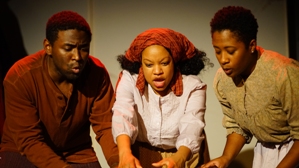 Esposito’s simple but effective scenic design and Kara McLeod’s mid-19th-century costumes are evocatively lit by Jesse Baldridge.
Esposito’s simple but effective scenic design and Kara McLeod’s mid-19th-century costumes are evocatively lit by Jesse Baldridge.
Allen Barstow, Jessica Jacobs, Maya Thomas, and Christopher T. Wood are understudies. Jasmine Moreno is stage manager.
With a stronger, less convoluted book, Dessa Rose might have seen a richer post-off-Broadway life than the one it has had, and it probably wouldn’t have taken over a dozen years to reach L.A. Still, imperfect as it is, Tabb’s and Carlson’s performances and Ahrens and Flaherty’s gorgeous score make Dessa Rose’s Los Angeles Premiere worth a Black History Month visit to Chromolume.
Chromolume Theatre at the Attic, 5429 W. Washington Blvd., Los Angeles.
www.crtheatre.com
–Steven Stanley
February 2, 2108
Photos: James Esposito
Tags: Chromolume Theatre, Los Angeles Theater Review, Lynn Ahrens, Stephen Flaherty



 Since 2007, Steven Stanley's StageSceneLA.com has spotlighted the best in Southern California theater via reviews, interviews, and its annual StageSceneLA Scenies.
Since 2007, Steven Stanley's StageSceneLA.com has spotlighted the best in Southern California theater via reviews, interviews, and its annual StageSceneLA Scenies.







 COPYRIGHT 2024 STEVEN STANLEY :: DESIGN BY
COPYRIGHT 2024 STEVEN STANLEY :: DESIGN BY